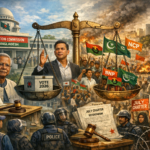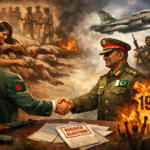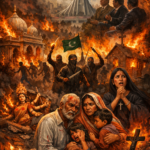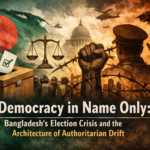In a move that has sent shockwaves through Pakistan and beyond, Asif Ali Zardari, the notorious figure known for his corruption and deceit, has once again been crowned as the President of Pakistan. This reinstatement of power for Zardari, a man infamously dubbed “Mr. 10%” for his alleged corruption penchant, marks a disturbing turn of events in the tumultuous political landscape of the country.
The history of Pakistan is fraught with political turmoil, military coups, and corrupt leadership. Asif Ali Zardari’s rise to power is a testament to this tumultuous history. Widely regarded as the architect of corruption within the political system, numerous scandals and allegations of embezzlement marred Zardari’s tenure as president from 2008 to 2013. His reputation as a corrupt and deceitful leader became synonymous with the decline of Pakistan’s democracy and governance.
Zardari’s return to the presidency comes at a time when Pakistan faces many challenges. Poverty is rampant, inflation is soaring, and sectarian infighting is at its peak. The country’s economy is in shambles, with widespread unemployment and a lack of essential services plaguing its citizens. Moreover, the spectre of terrorism and religious radicalisation continues to haunt Pakistan, posing a grave threat to regional stability.
The decision to reinstall Zardari as president raises serious questions about the state of Pakistan’s democracy and the influence of its military establishment. Many critics argue that the army orchestrates Zardari’s return to power to serve its agenda, further undermining the already fragile democratic institutions in the country. The military, long seen as the de facto power broker in Pakistani politics, continues to wield significant influence behind the scenes, often at the expense of civilian leadership.
Zardari’s past antics and his association with corruption and anti-Indian sentiment only deepen the concerns surrounding his return to power. During his previous tenure as President, Zardari was known for his inflammatory rhetoric and his aggressive stance towards India, exacerbating tensions between the two nuclear-armed neighbours. His reemergence as a political force will likely strain relations between the two countries further, potentially heightening the risk of conflict in the region.
The international community watches with apprehension as Pakistan’s political landscape descends into chaos once again. The country’s status as a nuclear-armed state only adds to the sense of urgency surrounding the situation. The prospect of a nuclear-armed Pakistan descending into further instability is a nightmare scenario that threatens the stability of the entire region and beyond.
In the face of these mounting challenges, Pakistan must take decisive action to address the root causes of its problems. Reinstating corrupt and divisive figures like Asif Ali Zardari only exacerbates the country’s woes and deepens the sense of despair among its citizens. Pakistan must prioritise genuine reform and tackle corruption head-on to chart a path towards stability and prosperity.
The road ahead for Pakistan is uncertain, but one thing is clear: the country’s future hangs in the balance. Unless meaningful change is implemented, Pakistan risks descending further into chaos, with potentially catastrophic consequences for the region and the world at large. The time for action is now before it is too late.
Pakistan’s political landscape has been deeply influenced by its military since its inception in 1947. Since the first military coup in 1958, Pakistan has experienced a tumultuous relationship between its civilian government and the powerful military establishment. The military, led by various generals over the years, has often intervened in political affairs, citing the need to safeguard national security and stability.
The first military coup 1958 saw General Ayub Khan seize power from the civilian government, citing rampant corruption and inefficiency. This marked the beginning of a pattern where the military would step in to restore order whenever it deemed the civilian government incapable or corrupt. Despite periodic returns to civilian rule, Pakistan’s political landscape has been heavily influenced by the military, which has often dictated the country’s domestic and foreign policies.
General Zia-ul-Haq’s military dictatorship in the 1980s further entrenched the military’s grip on power. During his tenure, Zia implemented Islamization policies and supported the Afghan mujahideen in their fight against the Soviet Union, cementing Pakistan’s role as a critical player in regional geopolitics. However, Zia’s authoritarian rule also led to a deterioration of democratic institutions and widespread human rights abuses.
Following Zia’s death in 1988, Pakistan experienced brief periods of civilian rule interspersed with military interventions. The 1990s saw a power struggle between civilian governments and the military, with General Pervez Musharraf eventually seizing power in a bloodless coup in 1999. Musharraf’s regime, while initially welcomed for its promises of economic reform and stability, soon faced criticism for its authoritarian tendencies and human rights violations.
Despite returning to civilian rule in 2008, the military has significantly influenced Pakistan’s political landscape. The military establishment, often called the “deep state,” wields considerable power behind the scenes, influencing critical decisions and shaping national policies to align with its strategic interests.
Against this backdrop, the reinstatement of Asif Ali Zardari as President raises serious concerns about the role of the military in Pakistani politics. Many observers see Zardari’s return as a calculated move by the army to maintain its grip on power while masking its influence behind the facade of civilian leadership.
The continued dominance of the military in Pakistani politics poses a significant challenge to the country’s democratic aspirations and stability. As long as the military remains a dominant force, Pakistan’s political landscape will continue to be marked by instability, corruption, and authoritarianism.
In light of these challenges, it is imperative that Pakistan’s political leaders, both civilian and military, prioritise the country’s long-term interests over their agendas. Genuine efforts to strengthen democratic institutions, promote transparency and accountability, and uphold the rule of law are essential for Pakistan to break free from the cycle of political turmoil and instability.
The international community, too, has a role to play in supporting Pakistan’s democratic transition and encouraging the country’s leaders to adhere to democratic norms and principles. Only through concerted efforts and a genuine commitment to democratic governance can Pakistan hope to overcome its challenges and realise its full potential as a stable, prosperous, and democratic nation.





